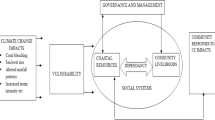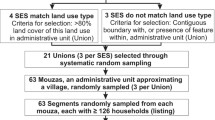Abstract
Like many developing countries, Ghana is grappling with environmental issues, such as the degradation of coastal natural resources. In an attempt to ameliorate the current state of affairs, broad institutional arrangements and policy interventions have been put in place. However coastal natural resources are still being overexploited and the effects of this are felt more strongly by certain groups (such as women and the rural poor) than others. This has led to the argument pointing to an urgent need to include local resource users as active participants in environmental decision making and to incorporate their environmental values in the management of coastal natural resources. Using empirical data from women in two Ghanaian coastal communities, this paper highlights the importance of exploring how the environmental attitudes and values of women might be considered in the management of local coastal natural resources. It assesses effectiveness of the paired comparison methodology in this respects and how this method can be also used to prioritise their environmental concerns. The results show that in both areas respondents place the greatest importance on the coastal natural resources as sources of wealth creation and of food, values which are often described as being “anthropocentric”. The paper thus argues that having discovered that the ecological value placed on natural resources is low, initiatives that could win the support of people would be those that link the livelihood and wellbeing to coastal NRM. It emphasizes the fact that conservation cannot exist outside of people and social systems; nor will it succeed unless they are linked to the welfare of resource users.




Similar content being viewed by others
References
Armah AK, Amlalo DS (1998) Coastal zone profile of Ghana. Gulf of Guinea Large Marine Ecosystems Project. Ministry of Environment, Science and Technology, Accra, Ghana
Braun V, Clarke V (2006) Using thematic analysis in psychology. Qualitative Research in Psychology 3:77–101
Brown TC (1984) The concept of value in resource allocation. Land Econ 60(3):231–246
Caldwell LK (1993) Achieving the National Environmental Policy Act (NEPA) intent: new directions in politics, science, and law. In: Hildebrand SG, Cannon JB (eds) Environmental analysis: the NEPA experience. Lewis Publishers, Boca Raton, pp 12–21
Caldwell LK, Shrader-Frechette K (1993) Policy for land: law and ethics. Rowman and Littlefield Publishers, Boston
Carr A (2002) Grassroots and the green tape: principles and practices of environmental stewardship. The Federation, Liechhardt
Chuenpagdee R (1998) Scales of relative importance and Damage Schedules: Non.-Monetary Valuation Approach for Natural Resource Management. Ph.D Dissertation. University of British Columbia
Chuenpagdee R (2003) Damage schedules for Thai coastal areas: an alternative approach to assessing environmental values. Available at http://203.116.43.77/publications/research1/ACFC9.html. Accessed October 19, 2005
Cohen JE, Small C, Mellinger A, Gallup J, Sachs J (1997) Estimates of coastal populations. Sci 278:1211–1212
David HA (1988) The method of paired comparisons. C. Griffin and Co., London
Directorate of Fisheries (2003) Ghana: post-harvest fisheries overview. Directorate of Fisheries, Ministry of Food and Agriculture, Ghana. Brightsea Press Ltd, Exeter
Earthtrends (2003) Coastal and marine ecosystems country profiles. Retrieved January 15, 2005, from http://earthtrends.wri.org
Eisenhardt KM (1989) Building theories from case study research. Acad Manag Rev 14(4):532–550
Laing E (ed) (1991) Ghana environmental action plan (vol. 1). E.P.C., Accra
Lawson ET (2010) Inclusion of women in coastal natural resource management, the role of environmental values. VDM Verlag, Saarbruecken
Manzo LC (2005) For better or worse: exploring multiple dimensions of place meaning. J Environ Psychol 25:67–86
Ministry of Environment, Science and Technology (MEST) (2004) Selection of sustainable development indicators for Ghana. MEST, Accra, Ghana
Neuman K, Watson BG (1993) Application of paired comparison methodology in measuring Canadian’s forest values. Proceedings of the Survey Research Methods Section. Where: American Statistical Association, 1091-4
Ntiamoa-Baidu Y, Souleymane Z, Deo-Gratias Mboje G, Bonnéhin L (2000) Principles in practice: staff observations of conservation projects in Africa. Biodiversity Support Program, Washington
Preston SM (2003) Landscape values and planning: the case of Ontario’s Niagara Escarpment. Ph.D. Disertation. University of Waterloo, Ontario, Canada
Quah E, Tan KC, Choa E (2003) Environmental valuation: damage schedules. Paper presented at the Economics and Environment Network National Workshop, May 2-3, 2003 at the Australian National University, Canberra, Australia
Rutherford MB, Knetsch JL, Brown TC (1998) Assessing environmental losses: judgments of importance and damage schedules. Harv Environ Law Rev 20:51–101
Stern PC, Dietz T (1994) The value basis of environmental concern. J Soc Issues 50(3):65–84
UNEP (2007) United Nations Environment Programme, 2007. Mangroves of Western and Central Africa. UNEP-Regional Seas Programme/UNEP-WCMC. Available at http://www.unepwcmc.org/resources/publications/UNEP_WCMC_bioseries/htm. Accessed 20 August 2006
United Nations Environment Programme/Priority Actions Programme /Mediterranean Action Plan (MAP) (1999) Conceptual framework and planning guidelines for integrated coastal area and river basin management. Split, Priorities Actions Programme. UNEP/MAP/PAP
White AT, Hale LZ, Renard Y, Cortesi L (eds) (1994) Collaborative and community-based management of coral reefs lessons from experience. Kumarian Press, Inc., West Hartford, Connecticut
Yin RK (1993) Applications of case study research (vol. 34). SAGE Publications Inc, London
Author information
Authors and Affiliations
Corresponding author
Rights and permissions
About this article
Cite this article
Lawson, E.T., Schluchter, W. & Gordon, C. Using the paired comparison methodology to assess environmental values in the coastal zone of Ghana. J Coast Conserv 14, 231–238 (2010). https://doi.org/10.1007/s11852-010-0096-1
Received:
Revised:
Accepted:
Published:
Issue Date:
DOI: https://doi.org/10.1007/s11852-010-0096-1




